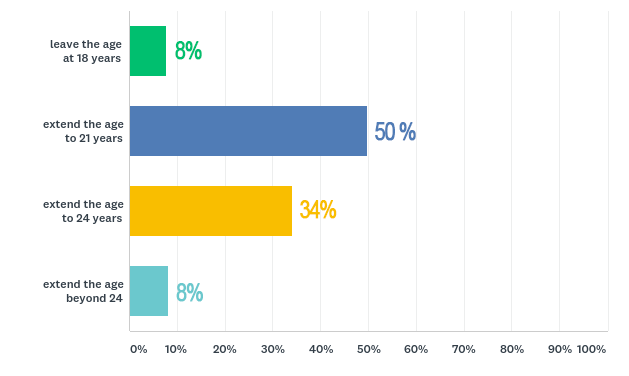
A huge ‘thank you’ to the 310 people who responded to the poll and particularly to the 177 who contributed to the over 11,500 words of comments. It will take us a bit longer to prepare a report that will do justice to the quality and diversity of the comments. In the meantime, here are the major themes.
The majority of respondents to the poll favoured the extension of support to young people in state care beyond the age of 18. The reasons they gave were broadly of four types:
- Birth parents in our community frequently support their children with accommodation, education, finance and in many practical ways beyond the age of 18. So should the state as parent.
- Children in care often have histories of neglect and abuse leading to developmental delays and the effects of trauma and their schooling is often affected by disrupted childhoods. This diminishes the capacity of many to cope with the responsibilities of adulthood at 18.
- High rates of homelessness, teenage pregnancy, mental health problems, substance abuse and unemployment and low levels of education and training demonstrate that many young people exiting care at age 18 are unprepared by the system to cope without further support.
- Recent research has demonstrated that human brain development and the capacity for self-regulation continue into the mid-twenties and beyond.
The right to opt out
Some respondents pointed out the legal and civil-liberties problems of extending the age of guardianship beyond 18. Many stressed that it was essential that care-leavers should have the choice to opt in to the services provided and have a say in what services were made available and how they should access them. Many stressed the right for young people to opt out of care situations they did not like.
How long should support last?
Many disputed the idea of setting a particular age at which support should cease and proposed that a marker could be used such as completion of education or training, stable accommodation or employment. Others favoured a professional assessment against a set of psychological indicators to show when a person no longer needed support.
What services should be provided?
A wide range of services and supports were proposed which included financial and other support for foster and kinship families to enable young people to stay on beyond 18 at least until education and training were complete. Some pointed out existing and proven services that could be extended and developed. Others noted that current transition planning left many young people unprepared and that extra resourcing and new approach was needed to transition.
A fuller analysis of comments later.

3 Responses
The many comments made about support to young people beyond the age of 18 is so valid.
I work with young people who do not have the capacity to manage their lives after leaving care and who find it difficult to support them selves due to a early history of disruptions and discontinuous family support.
I would have responded had I known about it. I’m a relative carer of 4 children, previously raised 2 older siblings. I’d extend the age to 21. Perhaps you can add me to your mailing list for future?
Certainly, Trude, I’ll make sure to add you to the list.
cheers
Malcolm